How does the immigration system work?
Immigration has been the main driver of US population growth for three years in a row. In this episode, Steve covers the green cards the US has issued recently, how the government defines “unauthorized immigrants,” how many people overstay visas, and more.
Up Next
Transcript
Hi, I’m Steve Ballmer. I spent 34 years growing Microsoft, 10 years owning the LA Clippers basketball team.
I love computers, data, and facts. That’s why I started USAFacts, to help understand what our government is up to and what’s going on in America.
I’ll share with you the facts and data, all from our government. You make up your own mind. In this episode of Just the Facts — Immigration.
Please note, there’s such a swirl of activity on this issue. Things might have changed since I recorded this in mid-June. I can’t predict the future, but I’ll be reading about it when it happens.
Most of us have an immigrant story. My maternal grandparents came to the US from what was then Russia, and my father came from Switzerland.
What we’re focused on here is how the immigration system works today and what the data says about how many immigrants we have coming into the country.
I’ve put things into three groups.
First, authorized immigrants whose visas offer no path to citizenship. This includes people allowed here on a temporary basis to work or attend school or to be with family. While visas are also given to tens of millions of people each year visiting on a short-term basis like vacation, I’m gonna focus on those who live here as temporary residents of the United States.
This includes those sponsored by a relative or employer, as well as people who have been granted asylum or refugee status.
Category three is unauthorized immigrants.
This is a government term that is a bit misleading because as we’ve researched it, I’ve learned that it included those who are here in violation of our laws, but also those who are here seeking asylum according to laws as they have existed since 1980, as well as migrants who are pre-approved to come to the United States due to humanitarian crises like what's happening in Haiti or Ukraine.
There are others in this unauthorized category that are actually entitled to be in the country, but more on this later.
Okay, now that we have identified our immigration categories, let’s dig in.
Group one. In 2022, the federal government awarded just over 2 million non-immigrant visas that do not have a path to citizenship, but do allow people to live temporarily in the United States.
These visas include everything from temporary agricultural workers to the H-1B visas we would have used at Microsoft, reserved for those who must have at least a bachelor’s degree.
Foreign students took up another 700,000 visas.
People coming here to join family is another 330,000.

In group two, those living here on an authorized basis with the option of a path to citizenship are the recipients of about 500,000 immigrant visas, granted mostly to those with a relative who is a citizen who lives here.
Some of these visas also go to immigrants who are coming here for work, who are adopted or who are among the 50,000 people who win a spot from the annual global lottery held to diversify America’s immigrant pool.
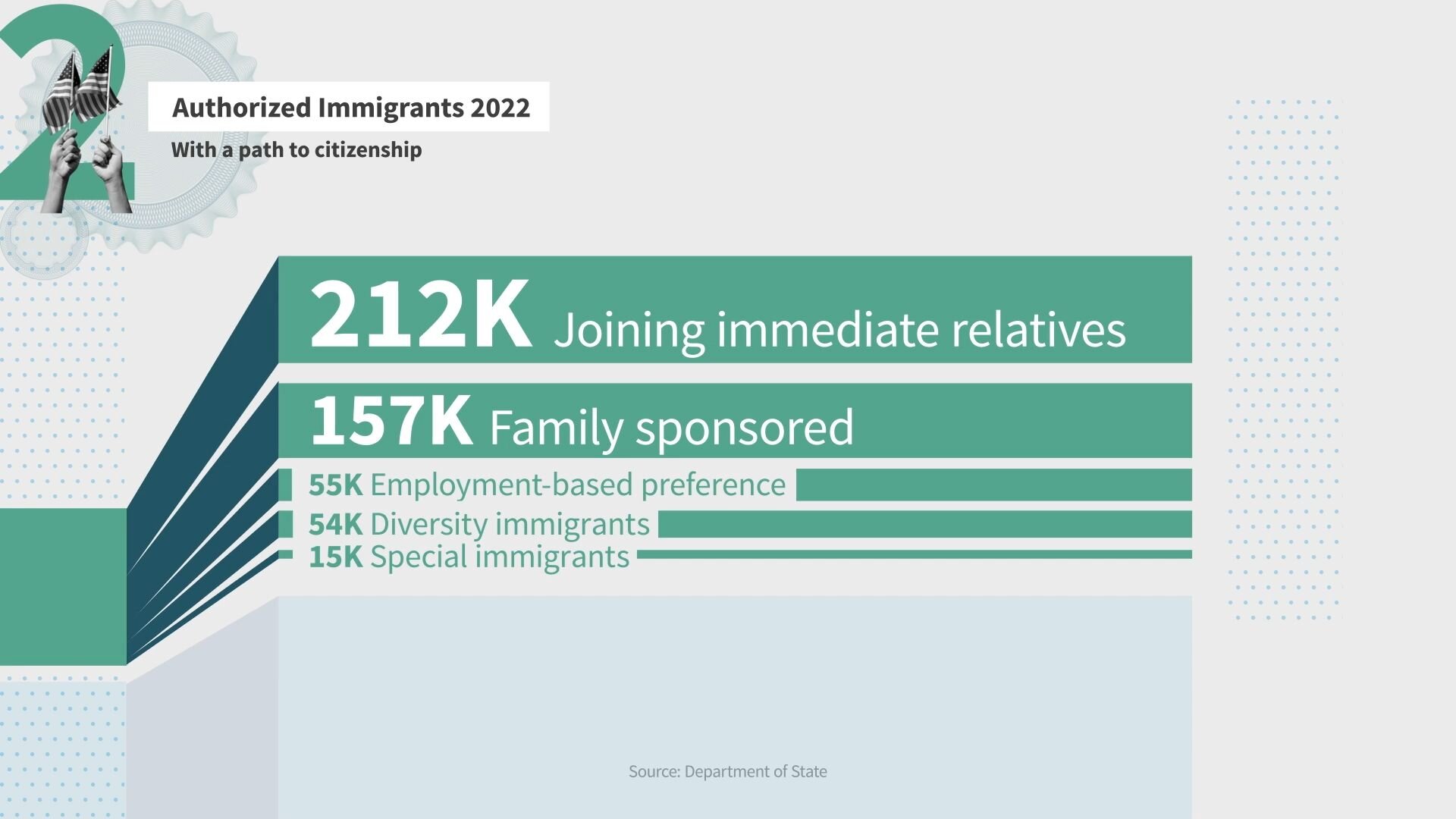
Once these visa recipients arrive in the United States, they are transferred to green card status.
In 2022, there was also an additional 500,000 immigrants who received green cards who were already in the United States. That’s a so-called adjustment of status.
A green card is kind of like Willy Wonka’s golden ticket if you’re an immigrant. It allows you to stay in the U.S. for up to 10 years before you need to renew it, and it does provide a path to citizenship.
Refugees are approved to come here while abroad, and about 26,000 of them came to the United States in 2022.
In 2022, about a million people became United States citizens. Let’s do a fact check on authorized immigration based on the 2022 data.
Two million people came without a path to citizenship, and 500,000 people arrived with a path.
Add in people who were granted asylum, and you get to 2.6 million new authorized residents.
Group three, unauthorized immigrants. What is an unauthorized immigrant?
Some examples — people who snuck into the country undetected, or snuck into the country but then later asked for asylum.
People who came to custom officials at the border and asked for asylum.
People who have come here from somewhere in turmoil, like Ukraine, and people who have overstayed their temporary visas.
The Department of Homeland Security estimates that the total unauthorized population living in the United States in 2022, the most recent number, is around 11 million people.
In 2010, that estimate was actually higher, 11.6 million people.
When our Customs and Border Protection officials intercept someone coming through an official point of entry, or when they apprehend someone who snuck in between lawful points of entry, they call that a border encounter.
There were 3.2 million total border encounters in 2023.
Of those, 2.5 million, or 77%, were at the southwest border.
Another 392,000 people came through airports, 189,000 people through the northern border with Canada, and 144,000 people came to our coastal borders.
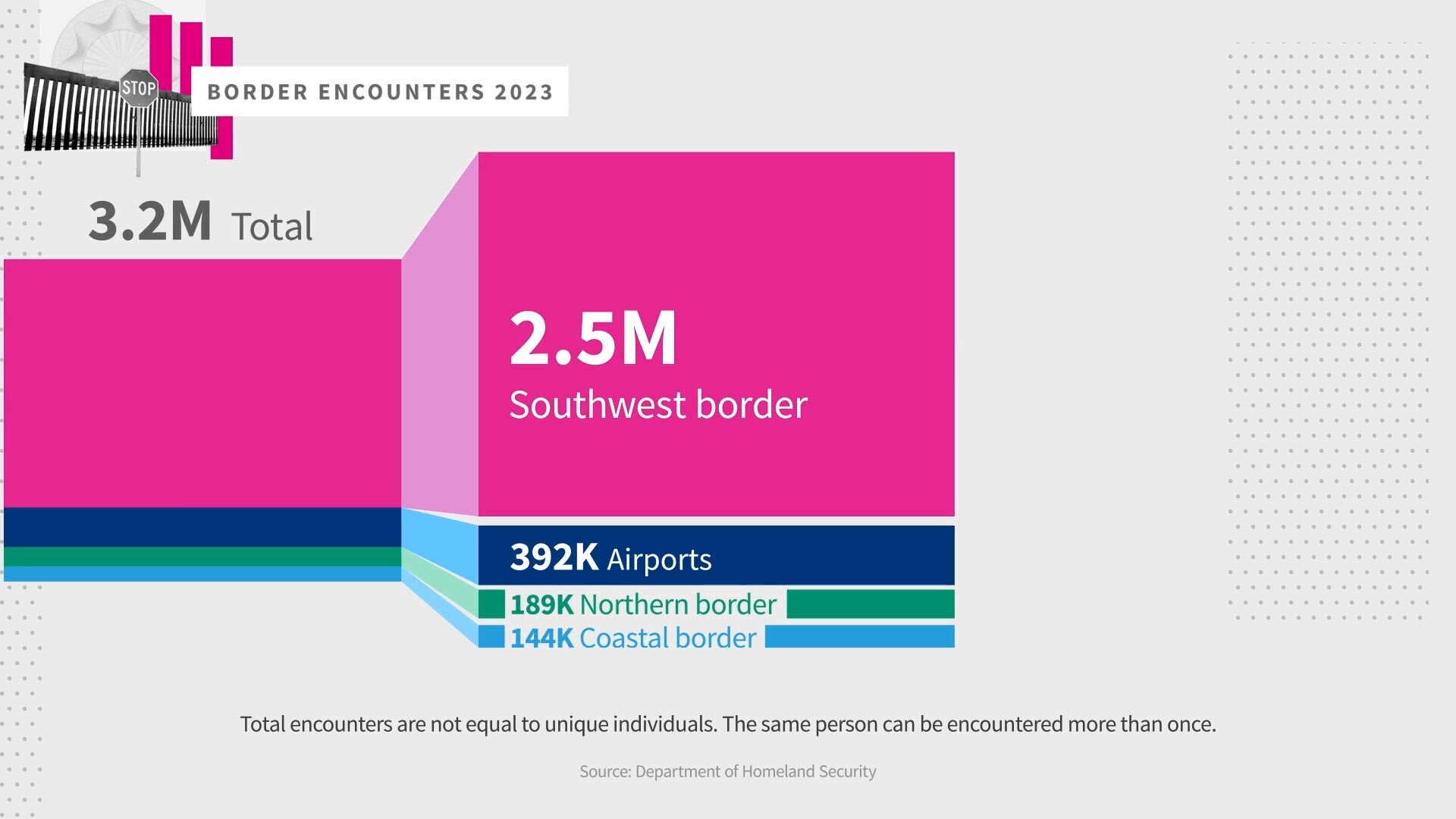
Right now, we’re going to focus on the big number, the 2.5 million people coming through the southwest border.
What exactly happens to all these people?
The first type of border encounter is called inadmissible, and these can happen only at official ports of entry into the United States.
These encounters occurred 430,000 times at the southwest border in 2023.
The second type of encounter occurs between ports of entry and is called an apprehension, and there were two million of them at the southwest border in 2023.
Now, a very important fact to know, if a person deemed inadmissible at a border crossing or apprehended between ports of entry asks for asylum, immigration law requires we give them a hearing.
That’s because of the 1967 United Nations Protocol relating to the status of refugees and later to the Refugee Act of 1980.
Okay, so of the 2.5 million encounters at the southwest border in 2023, let’s break them down.
1.3 million are permitted to enter the United States and are lawfully released pending an appearance at immigration court, or they admitted into the country for humanitarian reasons.
Those people will remain in the country potentially years as they wait for their hearing.
Back to the southwest border — 765,000 of the individuals encountered at the southwest border were repatriated or expelled in 2023.
This includes expulsions under Title 42.
Title 42 was a program where Unauthorized immigrants encountered at the border were expelled as quickly as possible in the interest of U.S. public health during COVID-19.
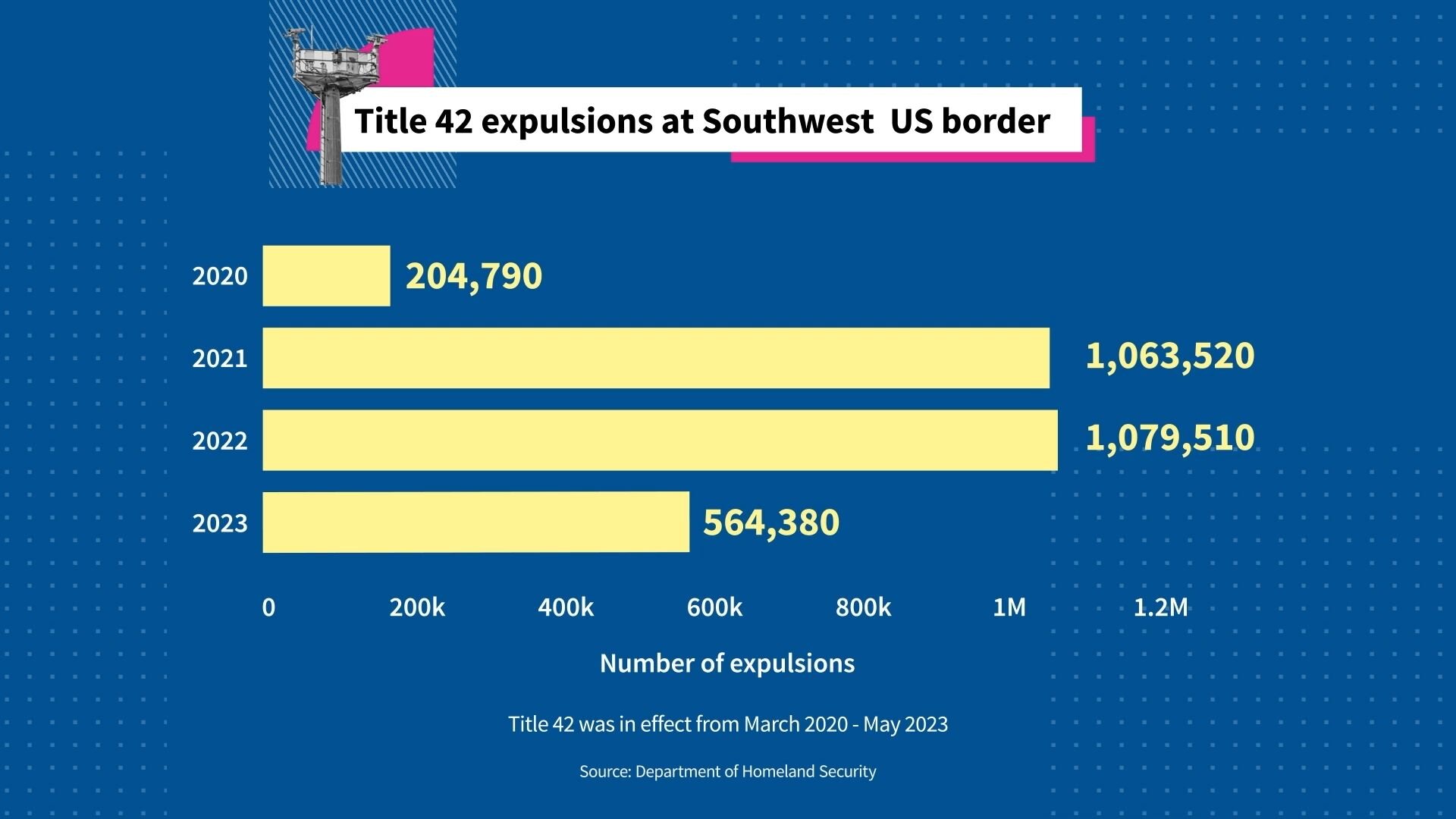
311,000 migrants were transferred to the supervision of the Immigration and Customs Enforcement, or ICE as it’s known, for further processing.
These people might have been detained or released.
ICE on average has 34,000 people in detention on any given day.
118,000 migrants were unaccompanied minors who were transferred to the Department of Health and Human Services care and custody determinations.
That sums up the two and a half million encounters with unauthorized immigrants that crossed the southwest border in 2023.
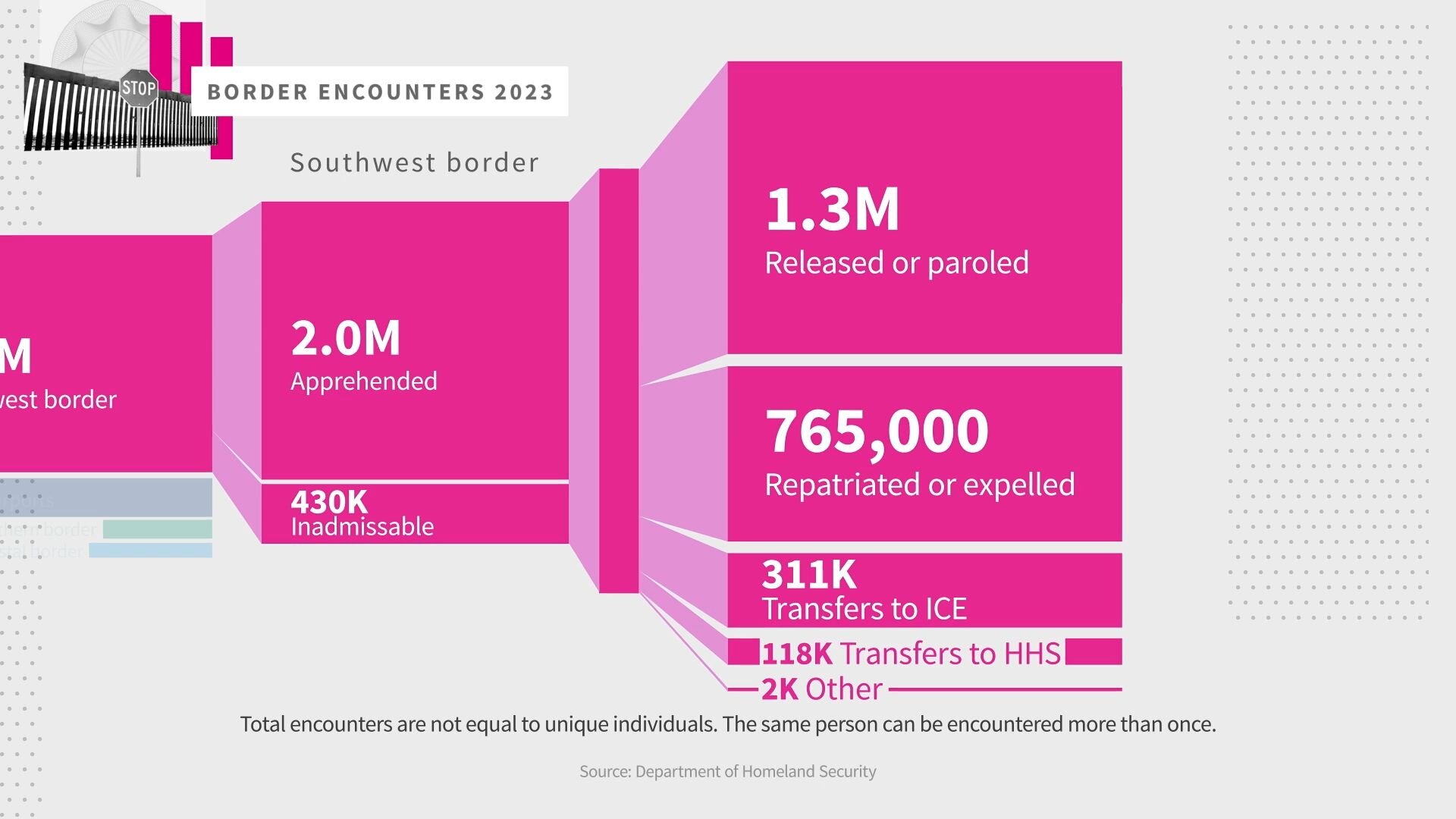
But it doesn’t end there — The Department of Homeland Security estimates that about 600,000 people in 2023 entered through the southwest border without being intercepted by Border Patrol officers.
Let’s step back for a fact check on unauthorized immigration.
Two and a half million encounters with unauthorized immigrants at the southwest border in 2023.
Of these encounters, 1.3 million people were released into the country.
430,000 more people were transferred to ICE, or Health and Human Services.
765,000 people were repatriated or expelled, plus an estimated 600,000 who entered the country undetected.
That means 2.3 million new unauthorized immigrants came over the southwest border into the country.
We do not know how many unauthorized immigrants may have left the country in the year.
For context, encounter numbers at the southwest border ranged between 400,000 and 600,000 per year from 2014 to 2018, reaching nearly a million in 2019.
After a dip in 2020 at the height of the pandemic, encounters at the border went up. to 1.7 million in 2021, 2.4 million in 2022, and reached the 2.5 million we discussed in 2023.
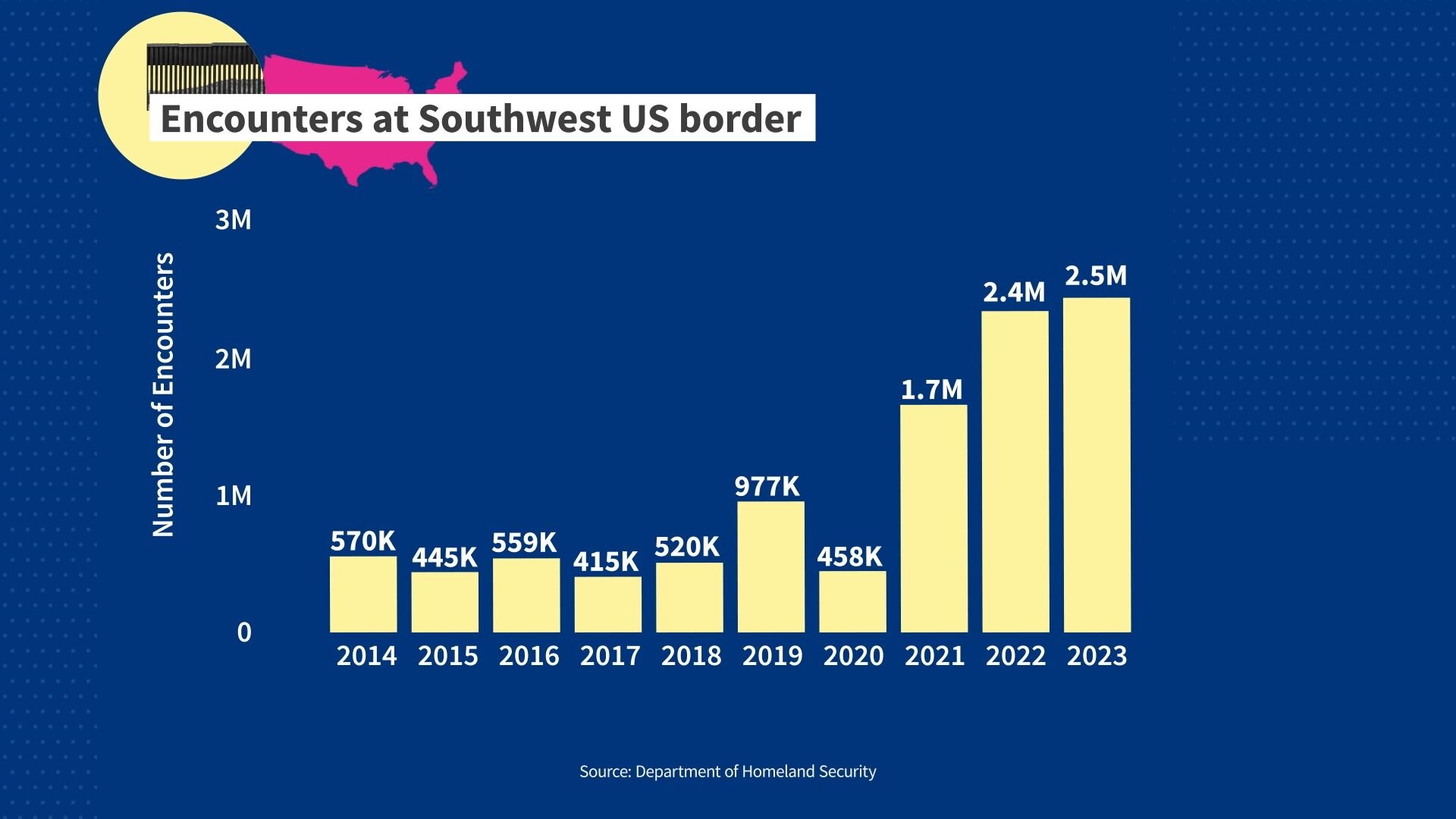
Now, I’m going to admit to being confused. Unauthorized immigrant assessments have been flat for a number of years at 11 million people, while the number of people coming into the country has increased.
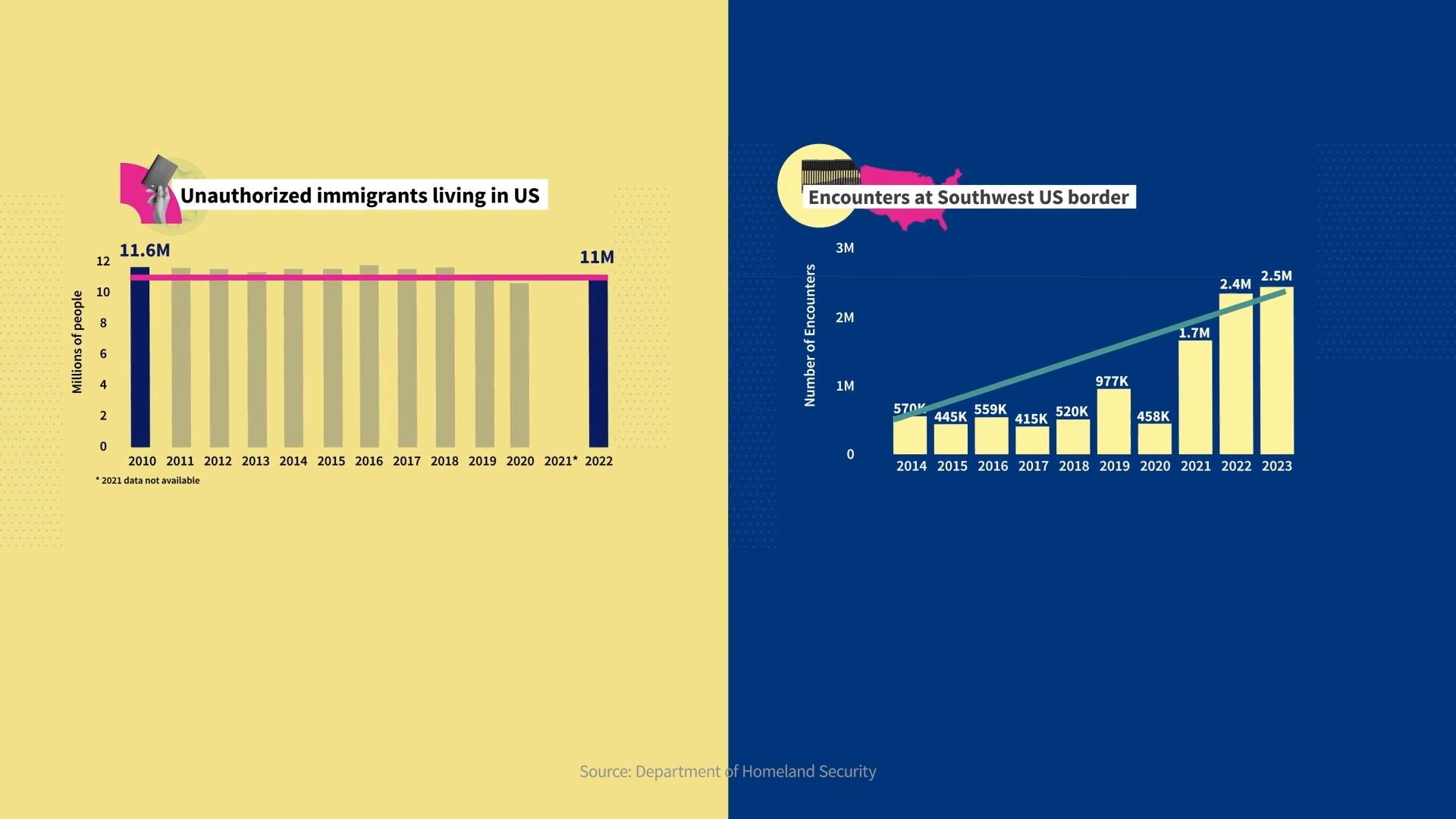
Our government needs to dig in and get all the required numbers to understand that.
Since many of the unauthorized immigrants are seeking asylum, let’s start by looking at the asylum system.
Looking at asylum cases in 2022, about 500,000 people applied.
While waiting for a court hearing, these migrants can get work permits from the federal government after their asylum application has been in process for 180 days.
Here’s the problem, though. This means many unauthorized immigrants have court cases years in the future.
At the end of 2023, there was a backlog of 2.5 million immigration court cases. In that same year, the courts handed down decisions on 222,000 asylum cases, granting asylum in just 32,000 of those cases.
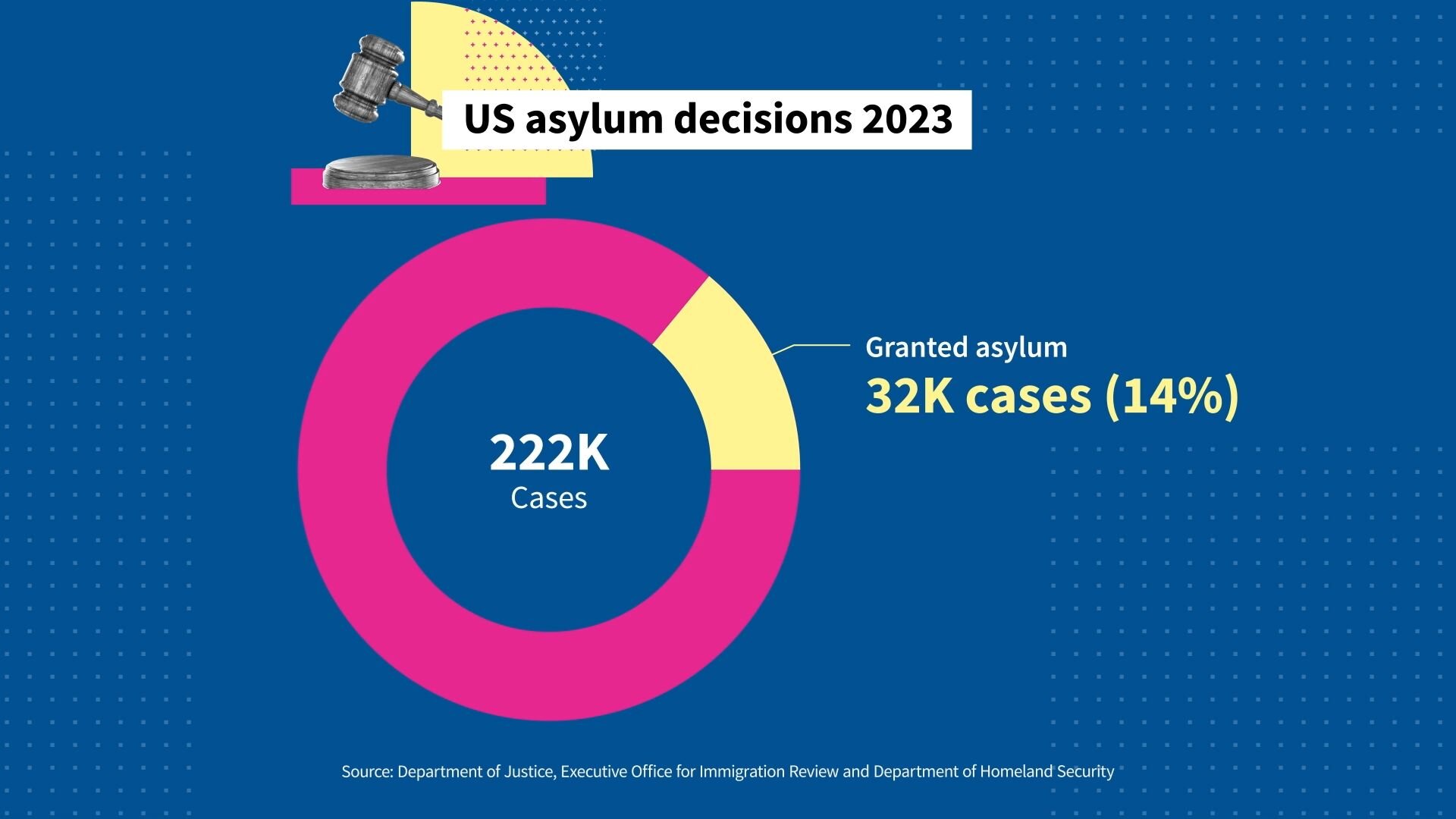
Now, there are a few other groups who are part of the unauthorized immigrant population. To start, we hear a lot in the news about Deferred Action for Childhood Arrivals, which is known as DACA, under which 545,000 people are living here in the United States.
Another big category is what’s called temporary protected status or TPS. Unauthorized immigrants living here may seek relief from deportation if the State Department deems their country unsafe to return to.
As of March 2024, 864,000 immigrants were in the United States under TPS.
There are also people overstaying their visas. DHS, Homeland Security, estimated 850,000 people to have overstayed their visas in 2022.
However, there’s no data on how long these people actually remain in the US.
Finally, let’s look at authorized and unauthorized immigration in the context of total US population.
Today, America has 335 million people, about 46 million of whom were born outside the United States.
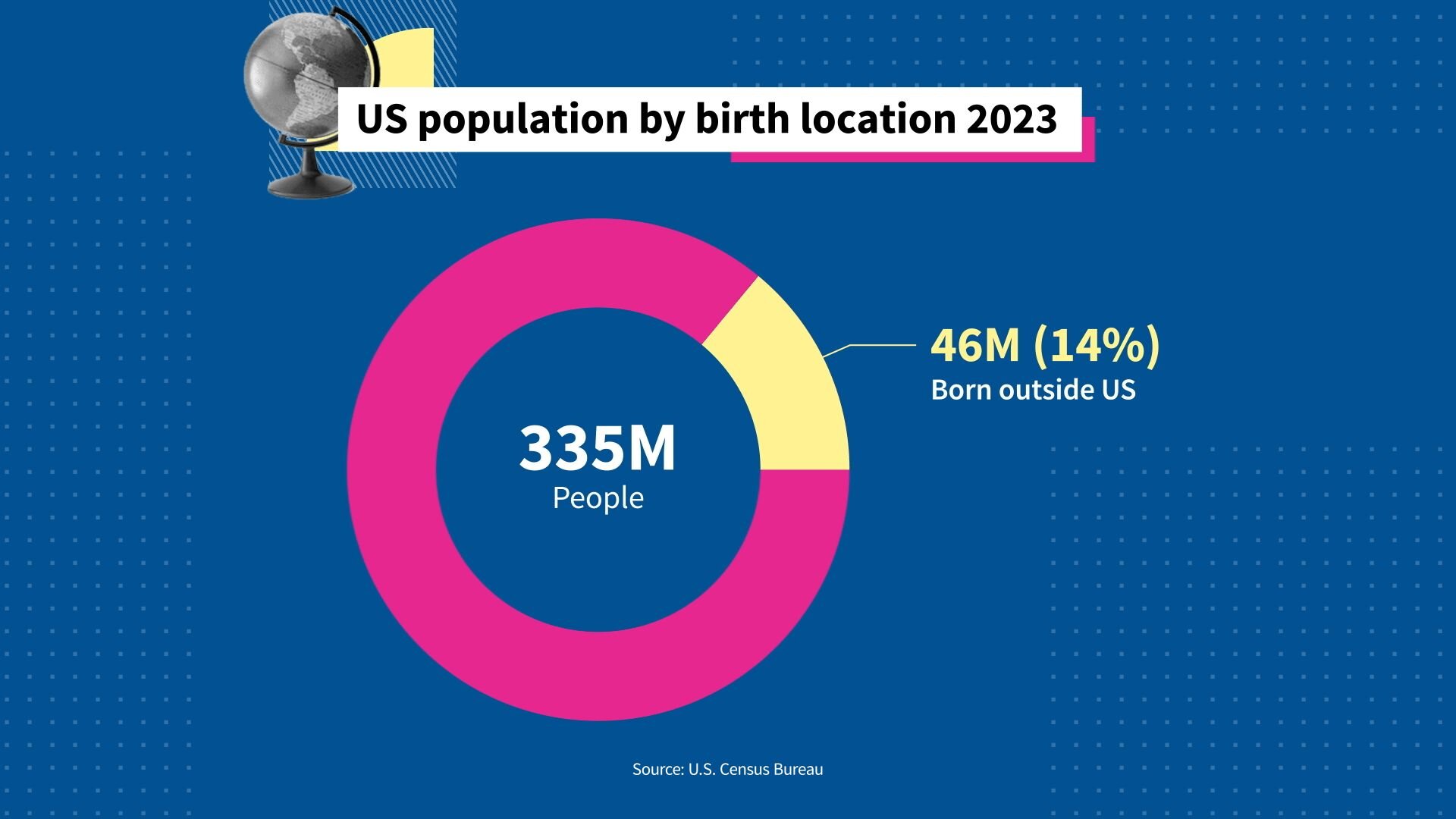
This is the third year in a row where immigration has been the main driver of population growth, which was 1.6 million people in total.
Out of that, 1.1 million came from immigration, while only 500,000 came from more people being born than dying, a consequence of our declining birth rate.
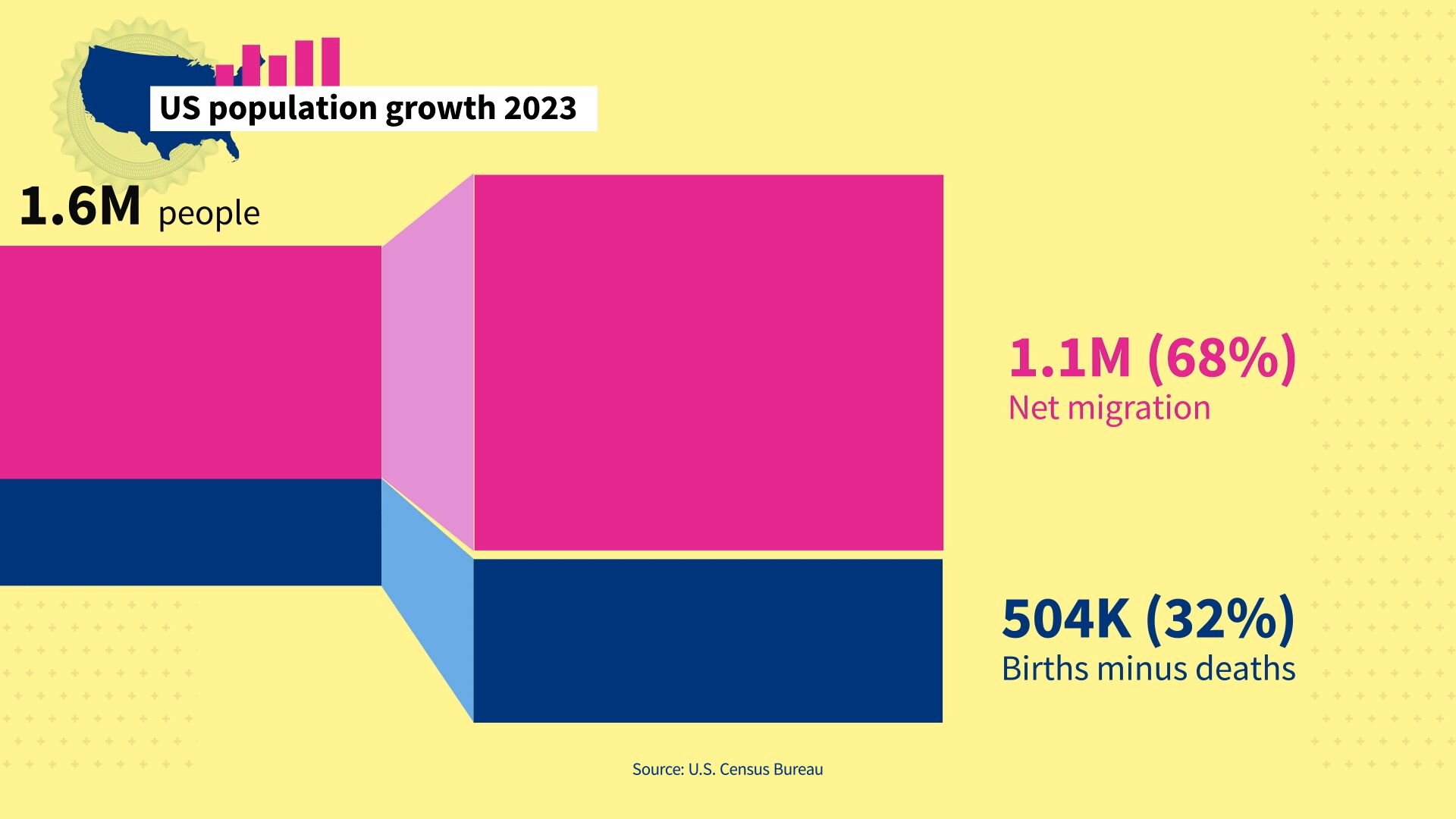
19% of our workforce, almost one in five workers, is foreign born.
I’ve learned a lot. I hope you have too. People want to come to America. It’s been that way for hundreds of years. Now it’s for you to decide. Is our system working?
What level of immigration do we want to have? How should things be changed?
The more we know, the better voters we can be.
Just the facts. You decide what you believe.
Page sources and methodology
All of the data on the page was sourced directly from government agencies. The analysis and final review was performed by USAFacts.
Centers for Disease Control and Prevention
U.S. Fertility Rate Drops to Another Historic Low
Congress.gov
S.643 - Refugee Act of 1979
Our government is complex. Our data doesn’t have to be.
Subscribe to our weekly newsletter to get data-backed answers to today’s most debated issues


